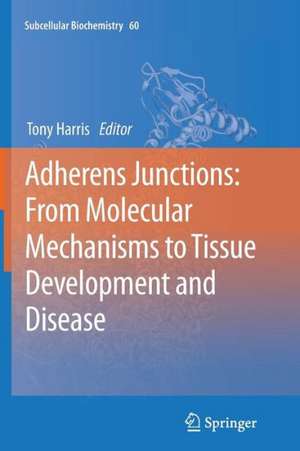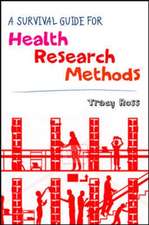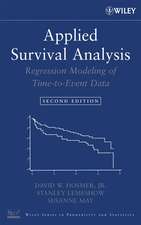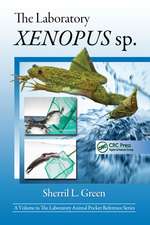Adherens Junctions: from Molecular Mechanisms to Tissue Development and Disease: Subcellular Biochemistry, cartea 60
Editat de Tony Harrisen Limba Engleză Paperback – 18 iul 2014
• How did AJs evolve?
• How do cadherins and catenins interact to assemble AJs and mediate adhesion?
• How do AJs interface with other cellular machinery to couple adhesion with the whole cell?
• How do AJs affect cell behaviour and multicellular development?
• How can abnormal AJ activity lead to disease?
| Toate formatele și edițiile | Preț | Express |
|---|---|---|
| Paperback (1) | 1417.54 lei 43-57 zile | |
| SPRINGER NETHERLANDS – 18 iul 2014 | 1417.54 lei 43-57 zile | |
| Hardback (1) | 1418.48 lei 43-57 zile | |
| SPRINGER NETHERLANDS – 8 iun 2012 | 1418.48 lei 43-57 zile |
Din seria Subcellular Biochemistry
- 18%
 Preț: 948.79 lei
Preț: 948.79 lei - 5%
 Preț: 1456.88 lei
Preț: 1456.88 lei - 18%
 Preț: 1373.84 lei
Preț: 1373.84 lei - 18%
 Preț: 1243.78 lei
Preț: 1243.78 lei - 18%
 Preț: 2098.81 lei
Preț: 2098.81 lei - 18%
 Preț: 1122.10 lei
Preț: 1122.10 lei - 5%
 Preț: 1160.63 lei
Preț: 1160.63 lei - 18%
 Preț: 1396.26 lei
Preț: 1396.26 lei - 18%
 Preț: 1114.96 lei
Preț: 1114.96 lei - 18%
 Preț: 1224.68 lei
Preț: 1224.68 lei - 18%
 Preț: 951.29 lei
Preț: 951.29 lei - 18%
 Preț: 1227.99 lei
Preț: 1227.99 lei -
 Preț: 398.15 lei
Preț: 398.15 lei -
 Preț: 399.88 lei
Preț: 399.88 lei - 18%
 Preț: 1231.47 lei
Preț: 1231.47 lei - 18%
 Preț: 1230.35 lei
Preț: 1230.35 lei -
 Preț: 392.60 lei
Preț: 392.60 lei - 18%
 Preț: 1231.47 lei
Preț: 1231.47 lei - 15%
 Preț: 638.76 lei
Preț: 638.76 lei - 5%
 Preț: 656.26 lei
Preț: 656.26 lei -
 Preț: 389.49 lei
Preț: 389.49 lei - 5%
 Preț: 659.19 lei
Preț: 659.19 lei -
 Preț: 392.37 lei
Preț: 392.37 lei - 5%
 Preț: 662.09 lei
Preț: 662.09 lei -
 Preț: 395.09 lei
Preț: 395.09 lei - 5%
 Preț: 667.99 lei
Preț: 667.99 lei -
 Preț: 400.47 lei
Preț: 400.47 lei - 18%
 Preț: 1224.54 lei
Preț: 1224.54 lei - 15%
 Preț: 647.73 lei
Preț: 647.73 lei - 15%
 Preț: 646.75 lei
Preț: 646.75 lei - 5%
 Preț: 662.30 lei
Preț: 662.30 lei -
 Preț: 395.25 lei
Preț: 395.25 lei - 18%
 Preț: 1230.21 lei
Preț: 1230.21 lei - 18%
 Preț: 1231.95 lei
Preț: 1231.95 lei - 18%
 Preț: 964.54 lei
Preț: 964.54 lei
Preț: 1417.54 lei
Preț vechi: 1492.14 lei
-5% Nou
Puncte Express: 2126
Preț estimativ în valută:
271.25€ • 283.92$ • 225.76£
271.25€ • 283.92$ • 225.76£
Carte tipărită la comandă
Livrare economică 31 martie-14 aprilie
Preluare comenzi: 021 569.72.76
Specificații
ISBN-13: 9789400796164
ISBN-10: 9400796161
Pagini: 440
Ilustrații: VI, 434 p.
Dimensiuni: 155 x 235 x 23 mm
Greutate: 0.61 kg
Ediția:2012
Editura: SPRINGER NETHERLANDS
Colecția Springer
Seria Subcellular Biochemistry
Locul publicării:Dordrecht, Netherlands
ISBN-10: 9400796161
Pagini: 440
Ilustrații: VI, 434 p.
Dimensiuni: 155 x 235 x 23 mm
Greutate: 0.61 kg
Ediția:2012
Editura: SPRINGER NETHERLANDS
Colecția Springer
Seria Subcellular Biochemistry
Locul publicării:Dordrecht, Netherlands
Public țintă
ResearchCuprins
1. An introduction to adherens junctions: from molecular mechanisms to tissue development and disease. - Part I: How AJs evolved. - 2. Evolution of the cadherin-catenin complex. - Part II: How cadherins and catenins interact to assemble AJs. - 3. The three-dimensional structure of the cadherin-catenin complex. - 4. Biophysics of cadherin adhesion. - 5. Adherens junction assembly. - Part III: How AJs interface with other cellular machinery. - 6. The cytoskeleton and classical cadherin adhesions. - 7. Immunoglobulin superfamily receptors and adherens junctions. - 8. Signaling from the adherens junction. - 9. Adherens junction turnover: regulating adhesion through cadherin endocytosis, degradation, and recycling. - Part IV: How AJs affect cell behaviour and multicellular development. - 10. Adherens junctions during cell migration. - 11. Adherens junctions and cadherins in Drosophila development. - 12. Adherens junctions in C. elegans embryonic morphogenesis. - 13.Cadherin function during Xenopus gastrulation. - 14. Adherens junctions in mammalian development, homeostasis and disease: lessons from mice. - Part V: How AJs affect tissue homeostasis and disease. - 15. Adherens junctions and stem cells. - 16. Adherens junctions and cancer. - 17. Adherens junctions and pathogens entry.
Textul de pe ultima copertă
Cell–cell adhesion is fundamental for the development and homeostasis of animal tissues and organs. Adherens junctions (AJs) are the best understood cell-cell adhesion complexes.
In this volume, internationally recognized experts review AJ biology over a wide range of organization; from atoms to molecules, to protein complexes, molecular networks, cells, tissues, and overall animal development. AJs have also been an integral part of animal evolution, and play central roles in cancer development, pathogen infection and other diseases. This book addresses major questions encompassing AJ biology.
- How did AJs evolve?
- How do cadherins and catenins interact to assemble AJs and mediate adhesion?
- How do AJs interface with other cellular machinery to couple adhesion with the whole cell?
- How do AJs affect cell behaviour and multicellular development?
- How can abnormal AJ activity lead to disease?
Valuable for both newcomers and experts in the field, this book offers a comprehensive resource for the research laboratory and a teaching tool for advanced undergraduate and graduate courses in cell and developmental biology.
In this volume, internationally recognized experts review AJ biology over a wide range of organization; from atoms to molecules, to protein complexes, molecular networks, cells, tissues, and overall animal development. AJs have also been an integral part of animal evolution, and play central roles in cancer development, pathogen infection and other diseases. This book addresses major questions encompassing AJ biology.
- How did AJs evolve?
- How do cadherins and catenins interact to assemble AJs and mediate adhesion?
- How do AJs interface with other cellular machinery to couple adhesion with the whole cell?
- How do AJs affect cell behaviour and multicellular development?
- How can abnormal AJ activity lead to disease?
Valuable for both newcomers and experts in the field, this book offers a comprehensive resource for the research laboratory and a teaching tool for advanced undergraduate and graduate courses in cell and developmental biology.
Caracteristici
Up-to-date reviews of adherens junction biology from internationally recognized experts in the field Covers adherens junction biology from atoms to overall animal development and disease A comprehensive resource for the research laboratory A comprehensive teaching tool for advanced undergraduate and graduate courses in cell and developmental biology Valuable for both newcomers and experts in the field Includes supplementary material: sn.pub/extras










